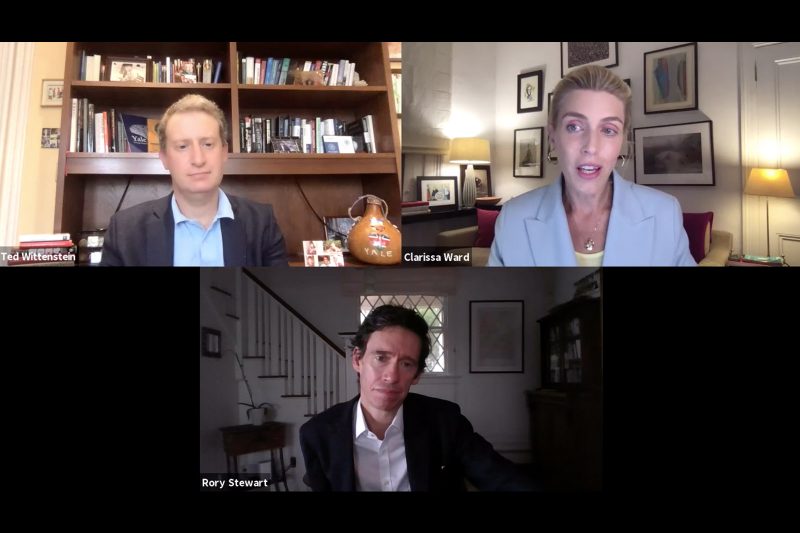Clarissa Ward ’02 is CNN’s Chief International Correspondent
On September 16, International Security Studies hosted the Virtual Discussion Forum, “Afghanistan: A View from the Frontlines,” featuring Clarissa Ward ’02, CNN’s Chief International Correspondent. Ward has just returned to London following her riveting, on-the-ground coverage of the American withdrawal from Afghanistan.
International Security Studies— dedicated to the study of history, grand strategy, and global security—will become a new research hub of the Jackson Institute on October 1.
More than 250 attendees tuned in for the session, which is part of a two-part series on Afghanistan; the second session is slated for September 21.
The discussion was moderated by Rory Stewart, a Jackson Senior Fellow and former UK secretary of State for International Development. He founded and ran the Turquoise Mountain foundation in Afghanistan.
Ward talked about the important role that journalists play, giving a voice to people who do not have an outlet and providing a glimpse at the granular reality behind the abstract jargon used by policymakers.
In the course of her reporting from Afghanistan in recent years and in the tragic aftermath of the U.S. withdrawal, Ward has interviewed Taliban commanders, members of the ISIS-K group, women in rural areas, and people in the crowds outside the airport in Kabul.
When asked about her impressions of the Taliban, Ward described a group that is more pragmatic now than in the 1990s, with a greater awareness “that it’s not just about fighting an insurgency—you have to be able to govern,” she said. But its fundamental ideology has remained the same, she said.
“The Taliban have not changed [over the last 20 years], but the people of Afghanistan have changed a lot,” Ward said, citing different expectations for women, particularly in the urban areas, and a greater willingness to confront the Taliban.
Ward also shared her perspective on why the Afghan security forces fell so quickly after most U.S. forces left. “They could see the writing on the wall,” she said. Lacking reliable re-supply of food and weapons to the army bases and air support from U.S. contractors, “they didn’t have a prayer of winning this fight,” she said.
Ward also talked about the challenge of reporting for television and the demands to condense and oversimplify a highly complex situation, with both sides looking to weaponize it for political ends.
Still, “it’s really crucial that the international media keep telling this story,” Ward said. “I think that we have a positive role to play in terms of letting the Taliban know that we’re standing there with a mirror and which is being projected around the world and that they will be held accountable,” said Ward, who is planning to return to Afghanistan soon.
